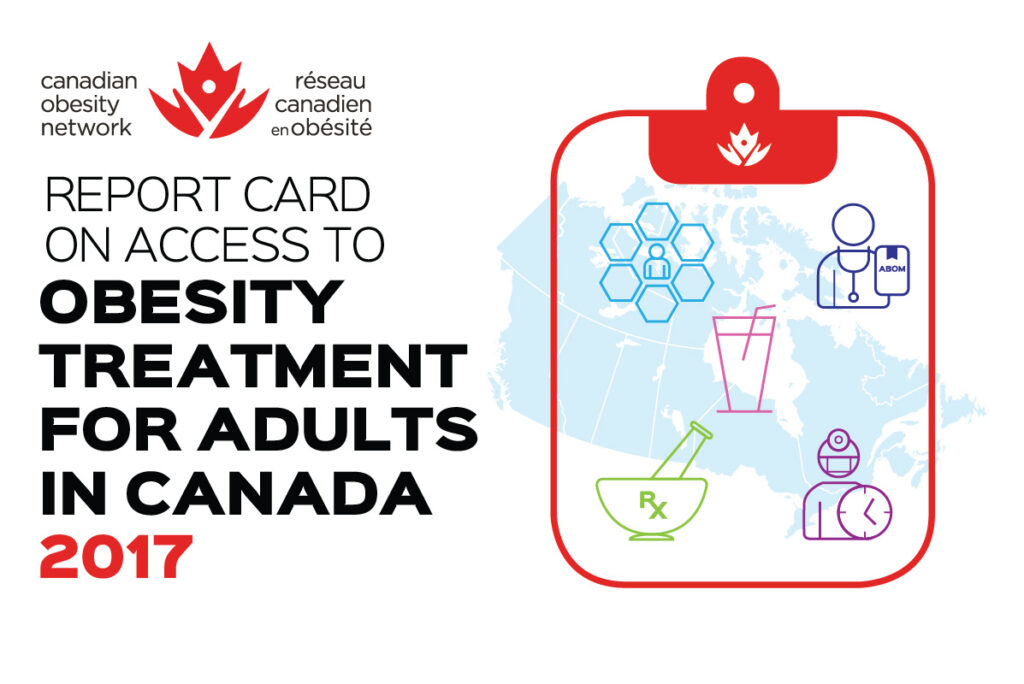
View the report in the following formats:
- Online slideshow (single page web application)
- Report Card Full Version (PDF)
- Report Card Infographic (PDF)
- Report Card Powerpoint Slides (PPTX)
Canadians living with obesity are gravely underserved by Canada’s public health systems and private benefits plans, according to a report we released in April, 2017.
The Canadian and American Medical Associations, the World Health Organization, the Canadian Obesity Network and other groups now consider obesity to be a chronic disease, like diabetes and cancer. However, many health systems, as well as private and public payers and policy makers, have yet to embrace this definition and dedicate sufficient resources in support of patients.
The Report Card On Access To Obesity Treatment For Adults In Canada 2017 identifies substantial shortfalls in access to treatments outlined in Canadian clinical practice guidelines established in 2006, including behavioural interventions, medically supervised weight management using meal replacements, anti-obesity medications and bariatric surgery.
The report makes seven key recommendations to improve Canada’s response to obesity, chief among them being the adoption of a true chronic disease approach to provide treatment and ongoing support for those with the disease.
Among the key findings are:
- There is a profound lack of interdisciplinary healthcare services for obesity management in Canada.
A very limited number of Canadian physicians are pursuing formal training and certification in obesity management. - Canadians who may benefit from medically-supervised weight management programs with meal replacements are expected to pay out-of-pocket for the meal replacements, in sharp contrast with coverage available for meal replacements used in diabetes, cystic fibrosis and cancer care.
- Those who rely on public coverage for prescription drug costs do not have access to the two prescription anti-obesity medications in Canada. Pharmacare programs in all the provinces and territories, as well as federal public drug benefit programs, receive a grade of F.
- Less than 20% of the Canadian population with private drug benefit plans have access to these medications.
Nationally, bariatric surgery is available to only 1 in 183 adults (or 0.54%) every year who may be eligible for it. There are vast differences in access to bariatric surgery from one province to the next. - Wait times between referral to bariatric surgery and consultation with a surgical team receive a grade of F in all provinces; wait times between consultation and bariatric surgery receive a C grade in Newfoundland, New Brunswick, Manitoba and Alberta, and a B grade in Nova Scotia, Quebec, Ontario, Saskatchewan and British Columbia.
“Treating obesity should only be initiated in patients when abnormal or excessive fat accumulation impairs health – in other words, not everyone of a certain weight or waist circumference needs medical interventions,” says CON-RCO Scientific Director Dr. Arya M. Sharma. “However, more than 1.5 million Canadians are classified as having Class II or III obesity*, which is associated with negative health outcomes. Clearly, we need to do a much better job of helping them with the tools at our disposal.”
Research suggests that obesity can be successfully managed using the interventions outlined in the Canadian guidelines. If left untreated, obesity can result in significant illness, a profound reduction in quality of life, and increased mortality.
Canadians living with obesity struggle with related health issues, rampant weight bias and discrimination and a lack of access to evidence-based management resources, says Marty Enokson, chair of CON-RCO’s Public Engagement Committee and an outspoken obesity care advocate.
“We have a long way to go in Canada before we can say we properly support people with obesity, not just with evidence-based medical interventions, but also with the respect and dignity that any person deserves,” Mr. Enokson says. “We don’t blame people living with cancer, heart disease or diabetes for their disease, and we don’t make them fend for themselves in terms of finding help.
“We have some treatments available for obesity, and there are more on the way – we need to be willing to use them, and we need to make them as accessible as possible, as we would for any other chronic illness,” he adds.
The Report Card On Access To Obesity Treatment For Adults In Canada 2017 was produced by the Canadian Obesity Network with the support of an unrestricted grant from Novo Nordisk Canada Inc
*Class II obesity defined as BMI: 35.00 kg/m2–39.99 kg/m2; Class III obesity is BMI: ≥ 40.00 kg/m2


